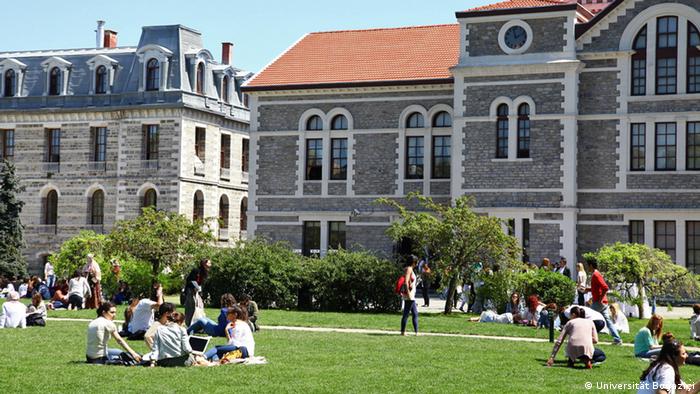In Turkey, many students are using ghostwriting
services to write final papers and dissertations. DW takes a look at
what has become a booming business.
Turkish universities are facing a new, not very academic challenge:
ghostwriting. From bachelor's and master's theses to doctor's
dissertations — almost any form of written academic paper can now be
ordered, for a price, from specialized companies.
Particularly at
private universities, there is a veritable boom in such ghostwriting.
Turkey has 63 private universities, most of them established within the
past five years.
A short search on online academic forums found
that some 50 companies are operating on this ghostwriter market. They
ask for the equivalent of between €500 and €3,000 ($567 and $3,400) per
paper. That tots up to revenue of more than €25 million per year.
Private universities to blame?
According
to Gorkem Dogan, the chairman of Egitim Sen, a union for those working
in education and academia, this significant rise in the number of
ghostwritten dissertations has been caused solely by the uncontrolled
increase in the number of private universities.
Dogan recalled the fact that many university teachers lost their jobs when a state of emergency was imposed
following the failed coup of June 2016. Many more than 100,000 public
service employees were formally suspended from their jobs, while more
than 6,000 academics were made unemployed just by a special decree from
President Erdogan.
"It may be hard to prove whether the
suspension of these academics caused the marked increase in ghostwriters
or not. But it is a fact that the suspensions were another real blow to
Turkey's already shaken academic sphere," Dogan said.
The main users: Medical students
A
DW reporter pretending to be a student writing his master's thesis
asked a representative of a ghostwriting company about the going prices.
The
employee said that he himself was an academic. "I am also on the
examination board for both the doctoral viva and the thesis defense," he
said. "I write any academic paper for 7,000 Turkish liras (€1,200)."
It became clear during the discussion that the company has
specialized in medicine, clinical psychology and management. "About 70
percent of the students we cater to are from medical faculties. When we
write a paper for them, we make use of the know-how of surgical or
orthopedic specialists, for example. The experts we work with receive a
monthly fee of €800 to €1,200 from us. Our prices for medical papers
start at €1,700," the company representative said.
He said that
these academic papers were invoiced. "It is not illegal, but perhaps
somewhat unethical," he said. When asked whether there were problems
with the examination board, he answered: "I am a member of the board
myself and mostly take on the role of the person asking critical
questions. What is more, the board includes friends of the advising
professor. One will speak out against the paper; the other will praise
it in the highest terms. And the third is there to tie up the deal."
No legal penalties
In
Turkey, ghostwriting is not subject to any legal penalties. Agencies
and companies that write academic papers for money operate under the
name of "academic consultants." The fee received is booked under "office
work."
If, however, a university does find out that a paper has
not been written by a student his or herself but by a third person, the
student can expect to be suspended. She or he will also be asked to
rework the paper.
Back in December 2016, the Turkish higher
education council, YOK, proposed making academic ghostwriting punishable
by fines. The council considers such activities as plagiarism. It said
that if a university teacher were discovered to have been the author of a
student's paper, she or he should face exclusion from the university,
which is tantamount to a dismissal. But these proposals remained just
proposals.
 Ghostwritten papers are less likely at established universities like the Bogazici University in Istanbul.
Ghostwritten papers are less likely at established universities like the Bogazici University in Istanbul.
Difficulty finding evidence
The
private universities in the Istanbul districts of Uskudar and Nisantasi
are among the institutes that are often suspected of allowing or
encouraging ghostwriting. We confronted Sevil Atasoy, the vice
chancellor of the Uskudar University, with the accusations that theses
at her institute were being ghostwritten for money. She responded by
calling on those making such accusations to present their proof.
Atasoy
said that five academic staff were on the committee for a thesis
defense, one of whom was from a different university. "Our staff are
conscientious and work in a highly professional manner," she said. "For
every dissertation that is presented, an evaluation is made as to
whether it contains any indications of plagiarism, for example. Our
advisers accompany every paper from the first to the last line anyway."
To this day, Atasoy said, there has never been a well-founded accusation regarding ghostwriting.
'Too few tenured professors'
Vahdet
Ozkocak, who heads OGESEN, the union of teaching staff, is of a
different opinion. He believes that the number of ghostwritten papers
has risen significantly. He said there were too few experienced academic
staff and tenured professors. According to Ozkocak, the ghostwriters of
the dissertations are, however, very experienced, several of them being
themselves academics.
He said that YOK had known about this
ethical problem for years, but had never taken measures to curb it.
Despite talk of a "new higher education council," nothing "new" had ever
eventuated, he said. "We can't solve our problems like this. Setting up
a ministry for university affairs is urgently necessary," Ozkocak said.
At
established state-run universities, passing off ghostwritten papers was
difficult, according to Ozkocak, while private universities saw
students only as paying customers. He lamented what he called a massive
loss of competence at universities over the past 20 years.
"Without recognition, competence and patriotism, the teachers turn to the unethical occupation of ghostwriting," he said.








